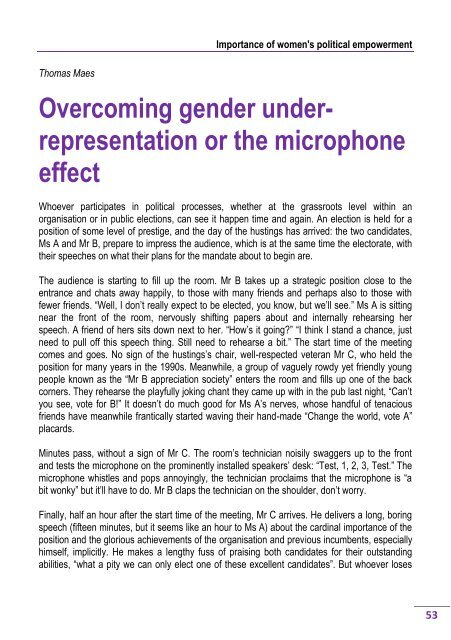Importance of women's political empowerement - Gurmai Zita
Importance of women's political empowerement - Gurmai Zita
Importance of women's political empowerement - Gurmai Zita
Create successful ePaper yourself
Turn your PDF publications into a flip-book with our unique Google optimized e-Paper software.
Thomas Maes<br />
<strong>Importance</strong> <strong>of</strong> <strong>women's</strong> <strong>political</strong> empowerment<br />
Overcoming gender underrepresentation<br />
or the microphone<br />
effect<br />
Whoever participates in <strong>political</strong> processes, whether at the grassroots level within an<br />
organisation or in public elections, can see it happen time and again. An election is held for a<br />
position <strong>of</strong> some level <strong>of</strong> prestige, and the day <strong>of</strong> the hustings has arrived: the two candidates,<br />
Ms A and Mr B, prepare to impress the audience, which is at the same time the electorate, with<br />
their speeches on what their plans for the mandate about to begin are.<br />
The audience is starting to fill up the room. Mr B takes up a strategic position close to the<br />
entrance and chats away happily, to those with many friends and perhaps also to those with<br />
fewer friends. “Well, I don’t really expect to be elected, you know, but we’ll see.” Ms A is sitting<br />
near the front <strong>of</strong> the room, nervously shifting papers about and internally rehearsing her<br />
speech. A friend <strong>of</strong> hers sits down next to her. “How’s it going?” “I think I stand a chance, just<br />
need to pull <strong>of</strong>f this speech thing. Still need to rehearse a bit.” The start time <strong>of</strong> the meeting<br />
comes and goes. No sign <strong>of</strong> the hustings’s chair, well-respected veteran Mr C, who held the<br />
position for many years in the 1990s. Meanwhile, a group <strong>of</strong> vaguely rowdy yet friendly young<br />
people known as the “Mr B appreciation society” enters the room and fills up one <strong>of</strong> the back<br />
corners. They rehearse the playfully joking chant they came up with in the pub last night, “Can’t<br />
you see, vote for B!” It doesn’t do much good for Ms A’s nerves, whose handful <strong>of</strong> tenacious<br />
friends have meanwhile frantically started waving their hand-made “Change the world, vote A”<br />
placards.<br />
Minutes pass, without a sign <strong>of</strong> Mr C. The room’s technician noisily swaggers up to the front<br />
and tests the microphone on the prominently installed speakers’ desk: “Test, 1, 2, 3, Test.” The<br />
microphone whistles and pops annoyingly, the technician proclaims that the microphone is “a<br />
bit wonky” but it’ll have to do. Mr B claps the technician on the shoulder, don’t worry.<br />
Finally, half an hour after the start time <strong>of</strong> the meeting, Mr C arrives. He delivers a long, boring<br />
speech (fifteen minutes, but it seems like an hour to Ms A) about the cardinal importance <strong>of</strong> the<br />
position and the glorious achievements <strong>of</strong> the organisation and previous incumbents, especially<br />
himself, implicitly. He makes a lengthy fuss <strong>of</strong> praising both candidates for their outstanding<br />
abilities, “what a pity we can only elect one <strong>of</strong> these excellent candidates”. But whoever loses<br />
53



